MaryAnn Bernal's Blog, page 197
February 12, 2015
History Trivia - Charles the Fat, the King of Italy, crowned Holy Roman Emperor
February 12

881 Pope John VIII crowned Charles the Fat, the King of Italy, Holy Roman Emperor. Charles was the grandson of Charlemagne who suffered from epilepsy and other illnesses; he also paid the Vikings to keep the barbarians from pillaging his empire.

1554 Lady Jane Grey, the nine day queen of England, was executed at the age of 16.
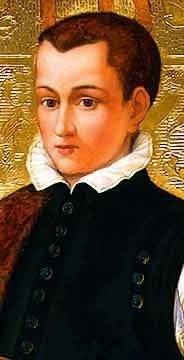
1554 Lord Guildford Dudley, Jane Grey's husband, was beheaded

881 Pope John VIII crowned Charles the Fat, the King of Italy, Holy Roman Emperor. Charles was the grandson of Charlemagne who suffered from epilepsy and other illnesses; he also paid the Vikings to keep the barbarians from pillaging his empire.

1554 Lady Jane Grey, the nine day queen of England, was executed at the age of 16.

1554 Lord Guildford Dudley, Jane Grey's husband, was beheaded
Published on February 12, 2015 02:30
February 11, 2015
England in the Time of King Richard III - free online course February 16 - March 26, 2015
 Register at Future Learn
Register at Future LearnExplore 15th century England through archaeology, history and literature. Learn more about Richard III’s discovery and reburial. About the course The discovery of the skeleton of Richard III in a Leicester car park - and the recent revelations of an infidelity within his family’s bloodline - have made headline news around the world.
Now, to coincide with his reinterment in Leicester Cathedral in March 2015, you can explore the world Richard III inhabited with this free online course from the University of Leicester.
As a special feature, the final week of the course will include live coverage of the reburial, giving you a unique viewpoint on the occasion.
Explore the Wars of the RosesThe political scene in the 15th century was dominated by savage dynastic warfare – the Wars of the Roses - in which allegiances and power shifted among an aristocratic clique, with devastating outcomes.
The century also saw the abandonment of many villages through general population decline, and a shift towards greater use of the land for pasture farming. But demand for labour meant that the prosperity of working people rose, and towards the end of the century, the introduction of printing transformed access to literacy and books.
Each week, we’ll address a different perspective of this period:
medieval warfarethe lives of peasants and farmersfood and culturedeath and commemorationreading and the introduction of printing.Follow the reinterment of Richard IIIFinally, we’ll look at how historians and archaeologists have reconstructed Richard’s road to Bosworth - the battle in which he died - and how one of England’s most famous kings came to be buried in Leicester.
This will help you understand Richard III’s reinterment, as his remains are taken to Bosworth, through the villages connected with his last battle, and finally laid to rest in Leicester Cathedral in March 2015, as the course takes place.
This course will also give you the opportunity to purchase a Statement of Participation.
To learn more about what to expect, read Deidre O’Sullivan’s post for the FutureLearn blog: “Follow King Richard III’s reburial with our updated course.”
 Educators
Educators
 Deirdre O'SullivanRequirementsAnyone interested in medieval England or the recent discovery and forthcoming reburial of Richard III will find something to fuel their interest here. No prior knowledge or expertise are needed.
Deirdre O'SullivanRequirementsAnyone interested in medieval England or the recent discovery and forthcoming reburial of Richard III will find something to fuel their interest here. No prior knowledge or expertise are needed.
Published on February 11, 2015 14:09
History Trivia - Christ's Cross was hewn on this day
February 11

Norway folk-belief: Christ's Cross was hewn on this day, and therefore the axe should not be used.
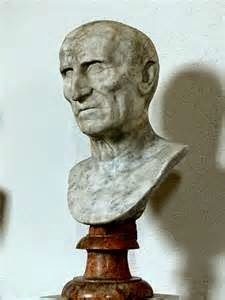
55 Tiberius Claudius Caesar Britannicus, heir to the Roman Emperorship, died under mysterious circumstances in Rome, clearing the way for Nero to become Emperor.
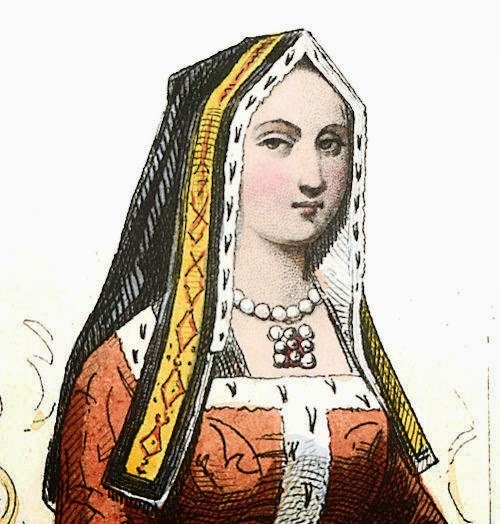
1466 Elizabeth of York Queen of England and mother of Henry VIII was born. Elizabeth had seven children and died in childbirth on February 11th, 1503.
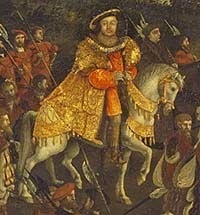
1531 Henry VIII of England was recognized as supreme head of the Protestant Church of England.

Norway folk-belief: Christ's Cross was hewn on this day, and therefore the axe should not be used.

55 Tiberius Claudius Caesar Britannicus, heir to the Roman Emperorship, died under mysterious circumstances in Rome, clearing the way for Nero to become Emperor.

1466 Elizabeth of York Queen of England and mother of Henry VIII was born. Elizabeth had seven children and died in childbirth on February 11th, 1503.

1531 Henry VIII of England was recognized as supreme head of the Protestant Church of England.
Published on February 11, 2015 02:30
February 10, 2015
Audio Book Launch - Scribbler Tales - Volume Two now available on Audible

Written by: Mary Ann Bernal Narrated by: Roberto Scarlato Length: 1 hr and 7 mins Unabridged Audiobook
Madeline's personal feelings clouds her judgment in "Broken Promises" where she must choose between love and obeying the law. When the guilty walk, a vigilante executes the criminals in "Deception". "Endgame" finds a government researcher running for her life after discovering a horrific CIA secret in an isolated facility. A modern day Don Juan's life is turned upside down in "Malice" when he is falsely accused of rape. In "The Portrait", Holliday is obsessed with a formidable ancestor whose spirit wishes to possess her soul.
Audible Link
Amazon Link
Published on February 10, 2015 16:42
What If Alexander the Great Left His Empire to One Person?
Laura Geggel
Live Science
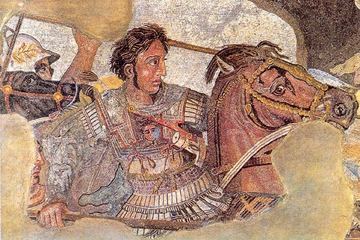
 In 332 B.C. Persian rule in Egypt came to an end with the arrival of Alexander the Great (pictured here). After his death a dynasty of Greek kings would take control of Egypt and would rule for the next three centuries.
In 332 B.C. Persian rule in Egypt came to an end with the arrival of Alexander the Great (pictured here). After his death a dynasty of Greek kings would take control of Egypt and would rule for the next three centuries.
Credit: Image courtesy Wikimedia, from an ancient mosaic in Pompeii, Italy View full size image
As Alexander the Great lay on his deathbed in 323 B.C., his generals reportedly asked to whom he left his empire. "To the strongest," Alexander said, according to historians.
"And, of course, they all started fighting about who the strongest was," said Philip Freeman, a professor of classics at Luther College in Decorah, Iowa, and author of the book, "Alexander the Great" (Simon & Schuster, 2011). "Pretty much right away his generals started fighting over who got his empire, and they divided it up."
Alexander's empire stretched from Greece to the Indus River in present-day Pakistan, an impressive territory of about 2 million square miles (5.2 million square kilometers). The Roman Empire exceeded Alexander's in size, but the king built his faster, in just 13 years, before he died at age 32.
With his passing, Alexander the Great left an unborn son and a crowd of ambitious generals. His generals eagerly filled the power vacuum, and his rivals killed his son before the boy's 12th birthday. [10 Reasons Alexander the Great Was, Well … Great!]
At the Partition of Babylon in 323 B.C., rulers split the empire into sections, with Greece, Macedonia and southeastern Europe making up one portion, Asia Minor (present-day Turkey) another and northern Africa a third. Western and central Asia went to other rulers.
Ptolemy, a Macedonian general who served with Alexander, created a separate empire in northern Africa and southern Syria. At first, Ptolemy ruled as an appointed leader, but in 305 B.C., he declared himself king. The Ptolemaic dynasty ruled for 275 years, from 305 B.C. to Cleopatra VII's passing in 30 B.C.
One empire, one emperor?
But what if Alexander had explicitly left his kingdom to one person? Could this person have further expanded his empire, or at least continued to keep it together despite its incredible size?
It's unlikely the empire would have expanded, historians say. Lacking Alexander's charisma and acumen, it's doubtful any single general could have carried on in Alexander's place, following his death at age 32.
"If one person had managed to gain immediate control of the empire, it probably would have fallen apart," Freeman told Live Science. "There was nobody there who had the skill, intelligence, charm and military talent to hold it together like Alexander."
However, it's possible that Alexander didn't mean to express uncertainty about his successor and rather meant to hand his kingdom to his general Perdiccas, said James Romm, a professor of classics at Bard College in New York and author of the book, "Ghost on the Throne: The Death of Alexander the Great and the War for Crown and Empire" (Knopf, 2011).
But within two or three years of Alexander's death, while trying to attack Ptolemy's kingdom in Egypt, Perdiccas was killed by his own officers.
"He didn't do a very good job, and he didn't last very long," Romm said. Perdiccas' death highlights the fact that Alexander's demise led to an inevitable struggle for control.
"There was no one to whom he [Alexander] could pass power to that would have been able to hold the empire together," Romm said. "In the absence of a royal heir, there really was no one."
Would world maps and major religions be different now?
But if one person had continued the empire, the history of the world would have changed, historians told Live Science. A magnetic leader with military brilliance could have invaded Sicily and Rome when Rome was heavily involved in fighting its rivals in the Samnite Wars, which spanned, though not continuously, from 343 to 290. A well-timed invasion would have given Alexander's successor an enormous advantage, and, if successful, could have prevented the Roman Empire from forming, said Kenneth Sacks, professor of history and classics at Brown University in Providence, Rhode Island.
Such a giant Greek and Macedonian empire could have altered the religious history of Judaism, Christianity and Islam, Sacks said.
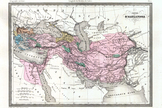 [image error]
[image error]
 An 1875 map shows Alexander the Great's empire.
An 1875 map shows Alexander the Great's empire.
Credit: Steven Wright | ShutterstockView full size imageIt's possible that some Jews would have become more Hellenized than they are today under such an empire, as Greek culture had already influenced some Jews at the time, Sacks said. For example, Hellenized Jews tended to follow fewer dietary rules and may have tried to hide their circumcisions in the Greek gymnasium, where athletes competed in the nude, he added.
In contrast, Muslims might have become less Hellenized than they are today, because they may have not been as exposed to it, Sacks noted. For instance, the Byzantine emperor, Justinian I, persecuted Greek philosophers when he closed the Platonic Academy in Athens in A.D. 529. In response, the philosophers began moving east, away from the empire. Eventually, after Islam arose, many of the philosophers moved to Baghdad and strongly influenced Islamic thinkers with Neoplatonism, Sacks said.
And Christianity, without the backdrop of the Roman Empire, might not have spread to the West, Sacks said, explaining how the Church used the empire's protected roads and harbor systems to spread the gospel. Moreover, "the Church precisely copied the organizational pattern of the Roman Empire, assuring it control and stability," Sacks said. [In Photos: A Journey Through Early Christian Rome]
The continuation of Alexander's empire also would have changed modern-day maps.
"If there's no Roman Empire, there's no Europe as we know it," Sacks said. "So who knows what happens to Europe. It's still not Christian in any sense, or if there is Christianity, it probably would not have spread to Europe. It would have probably been localized as one of these Christian sects in the Middle East, many of which died out."
Without Rome, Europe would not have Roman technology, such as the aqueducts that carried water from distant sources to populated areas, and the use of concrete in harbors, which helped lead to the Renaissance, Sacks added.
Yet, no such leader existed. "None of these field marshals seem to exhibit the same kind of great vision that Alexander exhibited," Sacks said. "Alexander had a vision of how to stabilize an empire, how to maintain an empire, and none of his successors really demonstrated that capacity."
Live Science

 In 332 B.C. Persian rule in Egypt came to an end with the arrival of Alexander the Great (pictured here). After his death a dynasty of Greek kings would take control of Egypt and would rule for the next three centuries.
In 332 B.C. Persian rule in Egypt came to an end with the arrival of Alexander the Great (pictured here). After his death a dynasty of Greek kings would take control of Egypt and would rule for the next three centuries.Credit: Image courtesy Wikimedia, from an ancient mosaic in Pompeii, Italy View full size image
As Alexander the Great lay on his deathbed in 323 B.C., his generals reportedly asked to whom he left his empire. "To the strongest," Alexander said, according to historians.
"And, of course, they all started fighting about who the strongest was," said Philip Freeman, a professor of classics at Luther College in Decorah, Iowa, and author of the book, "Alexander the Great" (Simon & Schuster, 2011). "Pretty much right away his generals started fighting over who got his empire, and they divided it up."
Alexander's empire stretched from Greece to the Indus River in present-day Pakistan, an impressive territory of about 2 million square miles (5.2 million square kilometers). The Roman Empire exceeded Alexander's in size, but the king built his faster, in just 13 years, before he died at age 32.
With his passing, Alexander the Great left an unborn son and a crowd of ambitious generals. His generals eagerly filled the power vacuum, and his rivals killed his son before the boy's 12th birthday. [10 Reasons Alexander the Great Was, Well … Great!]
At the Partition of Babylon in 323 B.C., rulers split the empire into sections, with Greece, Macedonia and southeastern Europe making up one portion, Asia Minor (present-day Turkey) another and northern Africa a third. Western and central Asia went to other rulers.
Ptolemy, a Macedonian general who served with Alexander, created a separate empire in northern Africa and southern Syria. At first, Ptolemy ruled as an appointed leader, but in 305 B.C., he declared himself king. The Ptolemaic dynasty ruled for 275 years, from 305 B.C. to Cleopatra VII's passing in 30 B.C.
One empire, one emperor?
But what if Alexander had explicitly left his kingdom to one person? Could this person have further expanded his empire, or at least continued to keep it together despite its incredible size?
It's unlikely the empire would have expanded, historians say. Lacking Alexander's charisma and acumen, it's doubtful any single general could have carried on in Alexander's place, following his death at age 32.
"If one person had managed to gain immediate control of the empire, it probably would have fallen apart," Freeman told Live Science. "There was nobody there who had the skill, intelligence, charm and military talent to hold it together like Alexander."
However, it's possible that Alexander didn't mean to express uncertainty about his successor and rather meant to hand his kingdom to his general Perdiccas, said James Romm, a professor of classics at Bard College in New York and author of the book, "Ghost on the Throne: The Death of Alexander the Great and the War for Crown and Empire" (Knopf, 2011).
But within two or three years of Alexander's death, while trying to attack Ptolemy's kingdom in Egypt, Perdiccas was killed by his own officers.
"He didn't do a very good job, and he didn't last very long," Romm said. Perdiccas' death highlights the fact that Alexander's demise led to an inevitable struggle for control.
"There was no one to whom he [Alexander] could pass power to that would have been able to hold the empire together," Romm said. "In the absence of a royal heir, there really was no one."
Would world maps and major religions be different now?
But if one person had continued the empire, the history of the world would have changed, historians told Live Science. A magnetic leader with military brilliance could have invaded Sicily and Rome when Rome was heavily involved in fighting its rivals in the Samnite Wars, which spanned, though not continuously, from 343 to 290. A well-timed invasion would have given Alexander's successor an enormous advantage, and, if successful, could have prevented the Roman Empire from forming, said Kenneth Sacks, professor of history and classics at Brown University in Providence, Rhode Island.
Such a giant Greek and Macedonian empire could have altered the religious history of Judaism, Christianity and Islam, Sacks said.
 [image error]
[image error]
 An 1875 map shows Alexander the Great's empire.
An 1875 map shows Alexander the Great's empire.Credit: Steven Wright | ShutterstockView full size imageIt's possible that some Jews would have become more Hellenized than they are today under such an empire, as Greek culture had already influenced some Jews at the time, Sacks said. For example, Hellenized Jews tended to follow fewer dietary rules and may have tried to hide their circumcisions in the Greek gymnasium, where athletes competed in the nude, he added.
In contrast, Muslims might have become less Hellenized than they are today, because they may have not been as exposed to it, Sacks noted. For instance, the Byzantine emperor, Justinian I, persecuted Greek philosophers when he closed the Platonic Academy in Athens in A.D. 529. In response, the philosophers began moving east, away from the empire. Eventually, after Islam arose, many of the philosophers moved to Baghdad and strongly influenced Islamic thinkers with Neoplatonism, Sacks said.
And Christianity, without the backdrop of the Roman Empire, might not have spread to the West, Sacks said, explaining how the Church used the empire's protected roads and harbor systems to spread the gospel. Moreover, "the Church precisely copied the organizational pattern of the Roman Empire, assuring it control and stability," Sacks said. [In Photos: A Journey Through Early Christian Rome]
The continuation of Alexander's empire also would have changed modern-day maps.
"If there's no Roman Empire, there's no Europe as we know it," Sacks said. "So who knows what happens to Europe. It's still not Christian in any sense, or if there is Christianity, it probably would not have spread to Europe. It would have probably been localized as one of these Christian sects in the Middle East, many of which died out."
Without Rome, Europe would not have Roman technology, such as the aqueducts that carried water from distant sources to populated areas, and the use of concrete in harbors, which helped lead to the Renaissance, Sacks added.
Yet, no such leader existed. "None of these field marshals seem to exhibit the same kind of great vision that Alexander exhibited," Sacks said. "Alexander had a vision of how to stabilize an empire, how to maintain an empire, and none of his successors really demonstrated that capacity."
Published on February 10, 2015 15:45
Early edition of Magna Carta discovered in Victorian scrapbook
 A close-up view of one of four remaining copies of the original Magna Carta, a document written in 1215, is seen at the Museum of Fine Arts in Boston June 30, 2014. (REUTERS/Gretchen Ertl)
A close-up view of one of four remaining copies of the original Magna Carta, a document written in 1215, is seen at the Museum of Fine Arts in Boston June 30, 2014. (REUTERS/Gretchen Ertl)An early edition of one of the world’s most famous documents, the Magna Carta, was unearthed in a pretty unexpected place – a scrapbook. Mark Bateson, a Kent, U.K.-based archivist, was tasked with looking for a charter from the town of Sandwich when he stumbled upon the rare find. He came across Sandwich’s Charter of the Forest in a Victorian-era scrapbook in the Kent County Council archives that just happened to also contain an edition of the groundbreaking document that dates back to 1300, the BBC reports.
This edition could be worth up to $15 million and is a very significant find, according to experts.
The find comes months before the 800th anniversary of the sealing of the document that established the principles of the rule of law. The first copy of the Magna Carta was drafted by the Archbishop of Canterbury on June 15, 1215. It was written to establish peace between King John of England and a group of rebel barons. Among the sanctions established by the law the Magna Carta ensured protections of church rights and limited feudal payments to the king.
The document found in Sandwich is not pristine – it was ripped and about a third of it was missing. Despite this, it is a rare and valuable find. The only other copy that dates back to 1300 is owned by Oriel College at Oxford University.
According the BBC, there are 24 known editions of the Magna Carta in existence
Fox News
Published on February 10, 2015 15:35
History Trivia - Robert the Bruce murders John Comyn
February 10
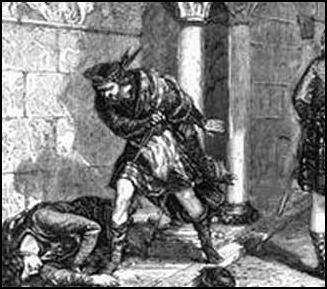
1306 Robert the Bruce murdered his leading political rival John Comyn in front of the high altar of Greyfriars Church in Dumfries and sparked revolution in the Scottish Wars of Independence.
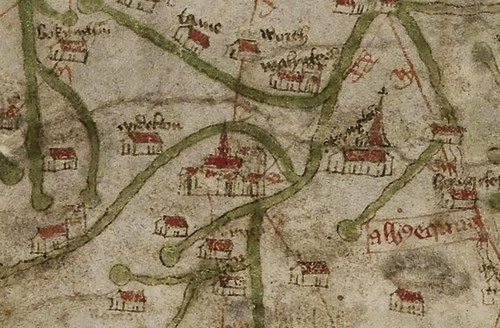
1355 the St. Scholastica's Day riot broke out in Oxford, England, where 63 scholars and perhaps 30 locals died.

1567 Lord Darnley, the second husband of Mary, Queen of Scots, was murdered in Edinburgh.

1306 Robert the Bruce murdered his leading political rival John Comyn in front of the high altar of Greyfriars Church in Dumfries and sparked revolution in the Scottish Wars of Independence.

1355 the St. Scholastica's Day riot broke out in Oxford, England, where 63 scholars and perhaps 30 locals died.

1567 Lord Darnley, the second husband of Mary, Queen of Scots, was murdered in Edinburgh.
Published on February 10, 2015 02:30
February 9, 2015
History Trivia - first recorded race meet in England (Roodee Fields, Chester)
February 9
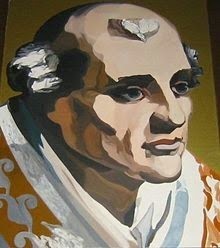
1119 Callistus II became pope. He settled the lay investiture disagreement and presided over the ninth Ecumenical Council (the First Lateran Council).

1540 The first recorded race meet in England (Roodee Fields, Chester) took place. According to official records, Chester Racecourse (Roodee Fields, Chester) is the oldest racecourse still in use in England.
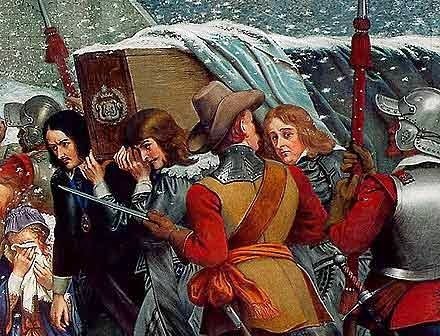
1649 Charles I was buried without a funeral at Windsor rather than Westminster to avoid public disturbances.

1119 Callistus II became pope. He settled the lay investiture disagreement and presided over the ninth Ecumenical Council (the First Lateran Council).

1540 The first recorded race meet in England (Roodee Fields, Chester) took place. According to official records, Chester Racecourse (Roodee Fields, Chester) is the oldest racecourse still in use in England.

1649 Charles I was buried without a funeral at Windsor rather than Westminster to avoid public disturbances.
Published on February 09, 2015 02:30
February 8, 2015
Whispering Legends Press Presents Scribbler Tales

Visit Whispering Legends Press
A fun fact about author Mary Ann Bernal Mary Ann is a proud Trekker who has attended numerous Star Trek conventions in New York City over the years. She has also participated in the Star Trek Experience at the Las Vegas Hilton and can be found on the Voyager bridge next to Captain Janeway.
 All of Mary Ann’s novels and short story collections are dedicated to fallen military heroes who gave their lives defending our freedom. A prolific writer originally hailing from New York, Mary Ann now resides in Omaha, Nebraska. Visit Mary Ann's webpage
All of Mary Ann’s novels and short story collections are dedicated to fallen military heroes who gave their lives defending our freedom. A prolific writer originally hailing from New York, Mary Ann now resides in Omaha, Nebraska. Visit Mary Ann's webpage
Published on February 08, 2015 15:54
Whispering Legends Press presents The Briton and the Dane novels

Visit Whispering Legends Press About featured author Mary Ann Bernal
 Mary Ann Bernal, author of The Briton and the Dane novels, has been a staunch supporter of the United States Military programs for the past thirty years. Even though she was born at the Patuxtant River Naval Air Station, she did not personally experience the life of a military brat, since her father was honorably discharged after nine years of service. Mary Ann currently resides in Omaha, Nebraska. Visit Mary Ann Bernal's webpage
Mary Ann Bernal, author of The Briton and the Dane novels, has been a staunch supporter of the United States Military programs for the past thirty years. Even though she was born at the Patuxtant River Naval Air Station, she did not personally experience the life of a military brat, since her father was honorably discharged after nine years of service. Mary Ann currently resides in Omaha, Nebraska. Visit Mary Ann Bernal's webpage

Published on February 08, 2015 15:37



